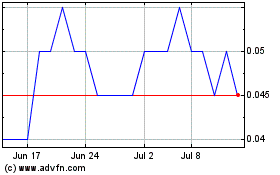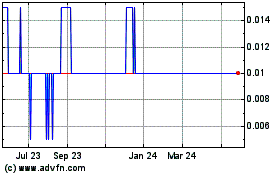Great Quest Metals Ltd.: Phase 1 Tilemsi Phosphate Drilling Completed with Favorable Results
September 26 2011 - 9:08AM
Marketwired
Victor J.E. Jones, President and CFO of Great Quest Metals Ltd.
("Great Quest" or "GQ") (TSX VENTURE: GQ)(FRANKFURT: GQM), is
pleased to report that the Phase I drilling campaign recently
completed at the Company's Tilemsi phosphate project has confirmed
the presence of high quality P2O5 phosphate mineralization, showing
a strong correlation with the targets from the remote sensing study
and prior reconnaissance work carried out on the concessions.
A total of 275 drill holes for 5049 meters were drilled using
two contractors, covering a small portion of the company's 737 km2
project. The program was executed on 2 of the presently defined 5
target areas - the Tin Hina (TH) and Alfatchafa (AF) hills. The
highly prospective Chanameguille target was not tested in the
initial round of drilling. Only some of the visually
distinguishable occurrences of mineralization were sampled. At Tin
Hina drill holes intersected 2 distinct horizons (seams) of
phosphate mineralization. Seam "A" averaged 23.73% P2O5 present in
104 of the drill holes and averaged 1.43m thick at an average depth
of 6.62 m. These holes include 4 deeper holes which intercepted a
second seam which averaged 27.60% P2O5 with an average thickness of
1.75m at an average depth of 8.00m below the seam A. The lower seam
may extend further but shallow drill holes would not have
intercepted it. Successful drill holes cover a surface area of
approximately 6.75km2 on Tin Hina.
Drilling on the Alfatchafa target identified a single seam with
samples averaging 22.69% P2O5 from 72 drill holes with an average
thickness of 0.90 m at an average depth of 18.75m. Successful drill
holes covered an area of approximately 6.70km2 on this target area.
The overburden in both areas consists of loose sands and silts.
Assay results from the drill samples suggest the phosphate rock
in both target areas is identical and of very high quality. The
phosphate rock is very low on many of the common impurities that
plague phosphate ores including cadmium, and uranium, making it
amendable to direct application. It also has negligible organic
carbon and the CaO/P2O5 ratio points to ore clean of calcite. No
size fraction analysis or concentration tests were attempted in
this phase of work but historical work suggests that inexpensive
techniques could be used to achieve attractive concentrate grades,
and removal of alumina and ferro-oxides would be simple.
The average percent of analyzed major oxides in the phosphate
rock are presented below:
------------------------------------------------------------------------
Area P2O5 SiO2 Al2O3 Fe2O3 CaO MgO Na2O
------------------------------------------------------------------------
AF 22.69 17.44 4.71 6.76 33.42 1.15 0.23
------------------------------------------------------------------------
TH a 23.73 16.08 4.22 7.13 34.65 0.85 0.23
------------------------------------------------------------------------
TH b 27.60 9.49 2.77 5.63 40.56 0.69 0.27
------------------------------------------------------------------------
----------------------------------------------------------------
Area K2O TiO2 MnO BaO LOI CaO/P2O5
----------------------------------------------------------------
AF 0.24 0.36 0.93 0.09 10.14 1.47
----------------------------------------------------------------
TH a 0.24 0.38 1.35 0.20 9.73 1.46
----------------------------------------------------------------
TH b 0.17 0.22 1.31 0.14 9.30 1.47
----------------------------------------------------------------
Mr. Ehud Levy a phosphate expert and Director of the company,
who up to two years ago was managing director of Bateman Chemical
Technologies, the Chemical division of the Bateman Litwin Group
stated, "the preliminary results from the exploratory drilling are
promising and show that the phosphate rock is of high quality,
which is most likely to make it suitable for direct application, as
well as phosphoric acid and fertilizer production." Natural
phosphate rock is favoured for the generally acidic soils of the
agricultural zones in Mali.
This first phase of drilling was accomplished using an aircore
drill rig for the first 36, followed by Rotary Air Blast "RAB" for
the rest of the holes. With both rigs, drilling in overburden
proceeded with samples taken every 1m. The sampling protocol
required that on or before entering the phosphate layer the sample
intervals were reduced to 25cm to enable overburden and seam
thickness determination. These phosphate rock samples were later
combined and shipped to the ALS Minerals facility in Bamako, Mali
for sample preparation. Sachets of the ground weighed samples were
sent to the ALS Minerals Vancouver lab for XRF analysis of P2O5 and
major oxides. ALS standards and standads from a third party source
were added to the sample list. Multi-element ICP analysis was also
carried out on selected samples, about 1 for every 10 samples.
This first phase of drilling has confirmed the presence of
significant areas of phosphate mineralization. A second phase is
planned that will follow up on the success and seek to extend areas
identified at both Tin Hina and Alfatchafa, which both remain open
in multiple directions, particularly to the east and south of Tin
Hina. Company prospecting and remote sensing work suggest the
mineralization could extend materially. The company also intends to
drill test the Chanameguille target and other targets to the north
of the areas drilled. The Company's Malian subsidiary is proceeding
with plans for continued drilling, bulk sampling, concentration
tests and preparation of a Preliminary Economic Assessment, which
will provide an initial techno-economic evaluation of the
project.
Follow link to remote sensing work outlining prospective targets
on the Tilemsi property:
http://www.greatquest.com/i/pdf/Tilemsi-Project-Remote-Sensing.pdf
Qualified Person
Jed Diner (P Geo) is the Qualified Person responsible in
accordance with NI 43-101 for the content, review and approval of
this News Release. Mr. Diner completed his MSc in Applied Earth
Science at Stanford University in 1983 and works internationally on
mineral exploration and resource development projects. He has
consulted on Phosphate projects in Uzbekistan, Peru and Angola.
ON BEHALF OF THE BOARD OF DIRECTORS OF GREAT QUEST METALS
LTD.
Victor J.E. Jones, President
Great Quest Metals Ltd. is a Canadian mineral exploration
company with assets in Mali, West Africa. The Company is focused on
developing the Tilemsi Phosphate Project, encompassing 737 km2 in
eastern Mali. The Company also holds several gold concessions in
the productive Birimian gold belt in western Mali. Great Quest is
listed on TSX Venture Exchange (GQ), and the Frankfurt Stock
Exchange (GQM).
12g3-2(b) Exemption #82-3116
Standard & Poor's Listed
The statements that are not historical facts and are
forward-looking statements involving known and unknown risks and
uncertainties could cause actual results to vary materially from
the targeted results.
Neither the TSX Venture Exchange nor its Regulation Services
Provider accepts responsibility for the adequacy or accuracy of
this release.
Contacts: Great Quest Metals Ltd. George Butterworth Investor
Relations 604-689-2882 or Toll Free: 877-325-3838 604-684-5854
(FAX) info@greatquest.com www.greatquest.com
Great Quest Fertilizer (TSXV:GQ)
Historical Stock Chart
From Jun 2024 to Jul 2024

Great Quest Fertilizer (TSXV:GQ)
Historical Stock Chart
From Jul 2023 to Jul 2024
